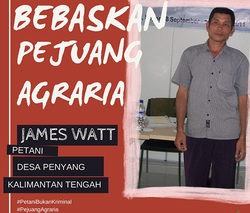Palm oil firm has farmers jailed for harvesting from land it stole from them
by Indra Nugraha, Yusy Marie on 17 March 2020 | Adapted by Hans Nicholas Jong
- A palm oil company found to be operating illegally outside its concession has filed a criminal complaint of theft against indigenous farmers who harvested palm fruit from that land.
- Local officials and rights groups have since 2010 declared that PT Hamparan Masawit Bangun, an affiliate of a group that supplies leading palm oil trader Wilmar International, has been operating illegally on community lands in Central Kalimantan province.
- The company has still not acted on an order to cede back to the community up to 1,800 hectares (4,450 acres) of illegally cultivated land.
- Instead, it has accused three indigenous farmers of stealing palm fruit from the land, in a case that activists say is emblematic of how corporations can weaponize law enforcement against communities over land disputes.
JAKARTA — Police in Indonesia have jailed three indigenous farmers for allegedly stealing oil palm fruit from a plantation company that is itself accused of stealing their land.
Police in East Kotawaringin district, in the Bornean province of Central Kalimantan, arrested Dilik Bin Asap and Hermanus Bin Bison from Penyang village on Feb. 17. They were accused of harvesting palm fruit on land claimed by the villagers but cultivated illegally by PT Hamparan Masawit Bangun Persada (HMBP), an affiliate of the BEST Group that supplies leading palm oil trader Wilmar International.
On March 7, police arrested prominent land rights activist James Watt in Jakarta, where he had gone to report the earlier arrests to the national human rights commission, known as Komnas HAM, and the witness protection program, or LPSK. They flew him back to Central Kalimantan and charged him with orchestrating the alleged theft by Dilik and Hermanus.
The case has sparked outrage among indigenous rights activists. In the wake of the arrests of Dilik and Hermanus, community members blocked the road leading to PT HMBP’s plantation. Police arrested 11 of them before releasing them shortly after.
Illegal planting
The case is the latest in a litany list of land disputes between forest communities and corporate concession holders, with authorities almost invariably siding with the latter each time.
According to the Penyang villagers, PT HMBP has cleared forests and cultivated oil palms on land outside its concession, encroaching onto the community’s land. They have lodged complaints with multiple authorities, including the East Kotawaringin district government and council, and Komnas HAM.
In 2010, the district chief officially declared that PT HMBP was operating outside its concession and ordered it to cede the disputed land back to the community. The following year, the district council determined that the company had illegally planted on 1,800 hectares (4,450 acres), and echoed the district chief’s call to hand the land back to the villagers. Komnas HAM also called on the company to follow through.
Wilmar maintains a policy of “No Deforestation, No Peat, No Exploitation,” or NDPE, that obliges its suppliers to, among other things, “respect land tenure rights.”
But it wasn’t until October 2019 that PT HMBP acted. Even then, it said it would only relinquish control of a fraction of the disputed land — 117 ha, or 290 acres — either completely or partially, offering to manage it in collaboration with the villagers.
The recent arrests stem from this statement, according to Dimas Novian Hartono, the Central Kalimantan director of the Indonesian Forum for the Environment (Walhi): the community took the statement at face value, he said, and believed the land was theirs once again to harvest from. But PT HMBP saw it differently and filed criminal charges against Dilik and Hermanus.
Silencing critics
The Central Kalimantan police have denied the arrests are directly linked to the land dispute, characterizing the charges as purely criminal.
But activists call it a blatant attempt by the company to quash opposition to its land grab, citing among other irregularities the late-night arrest of James Watt as he attempted to report the matter to higher authorities in Jakarta. James was previously featured by Mongabay and The Gecko Project in a joint investigative report into the palm oil licensing practices of Darwan Ali, the former head of Central Kalimantan’s Seruyan district.
Arif Nur Fikri, the head of advocacy at the independent NGO Commission for Missing Persons and Victims of Violence (Kontras), said the police should have looked at PT HMBP’s complaints of theft in the wider context of the land dispute.
“This agrarian conflict has received recommendations [in support of the community] from Komnas HAM, the district council, the district chief, and the district land agency,” Arif said.
Arie Rompas, from Greenpeace Indonesia, said the case was another classic example of how corporations wielded the police to crack down on critics.
“The problem is that the police aren’t carrying out their function of upholding justice,” he said. “They worked in response to a complaint filed by the company, which has clearly engaged in illegal activities” by planting outside its concession.
Walhi’s Dimas said his office would continue pressing for the release of and dropping of criminal charges against James, Dilik and Hermanus. A truce with the company is not an option, he added.
“Making peace is the same as acknowledging the presence of the company, which has robbed the people of their land,” Dimas told Mongabay.













